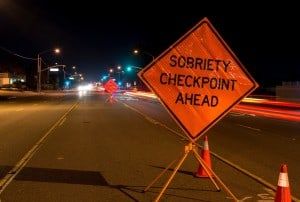 Sobriety checkpoints are still a hot-button issue in the US. The Supreme Court has declared them a reasonable search, but many people dislike the idea of stopping cars at random to ask if the driver is impaired. At present 38 states including North Carolina have laws allowing sobriety checkpoints, and the rest do not.
Sobriety checkpoints are still a hot-button issue in the US. The Supreme Court has declared them a reasonable search, but many people dislike the idea of stopping cars at random to ask if the driver is impaired. At present 38 states including North Carolina have laws allowing sobriety checkpoints, and the rest do not.
One common question drivers ask is, “If I see a checkpoint ahead, is it legal to turn around beforehand to avoid it?”
The answer is a qualified “Yes.” Yes because nothing technically stops you from turning around if you see the “Sobriety Checkpoint Ahead” sign. Qualified because in North Carolina, if you do avoid a checkpoint, officers have a right to stop you and ask why.
Checkpoints operate under strict rules to pass the test of constitutionality. They must be publicized in advance, and when they are set up, they must either check all vehicles or choose them on a random basis. They also cannot detain drivers for an unreasonable amount of time.
What are checkpoint officers looking for?
- Evidence of impairment. First and foremost, checkpoints exist to take drunk and drugged drivers off the road. An officer will ask you if you have been drinking, or are under the influence of any substance. He or she will check your eyes, listen to your speect, and observe your movements. If the officer finds any evidence of impairment, things will advance to the next stage and you’ll be given a field sobriety test.
- Suspended licenses. All too many suspended drivers continue to drive, so the officer will very possibly check to see that your license is current.
- Unregistered or uninsured vehicles. An unregistered vehicle is uninspected and possibly a safety hazard, and lack of insurance is a serious violation. The officer will give these a check.
- Observable vehicle violations. If your taillight is out, your turn signal faulty, or one of your headlights out, you can expect a ticket.
Given that all the things the checkpoint officers are looking for are unlawful, and most are dangerous, the question is: why would you turn around to avoid a sobriety checkpoint? If it’s to avoid a DUI, then you should not be on the road in the first place. If it’s to avoid another kind of ticket, the same applies.
Moreover, it’s possible that, while avoiding the checkpoint, that you commit a traffic infraction, say, by making an illegal U-turn. That will land you in trouble.
Whether or not you agree with the idea of checkpoints, they do serve to catch impaired drivers and unsafe vehicles and reduce collisions on the road. So if you are stopped at a sobriety checkoint, the best policy is to comply and answer questions. If you’re sober, and not committing any other violation, you’ll be on your way in no time.
